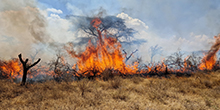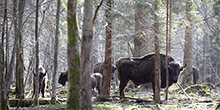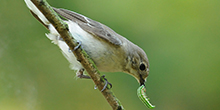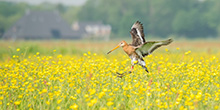Research
The Conservation Ecology Group aims to contribute both to fundamental insights in structure and functioning of communities and ecosystems on both ecological and evolutionary time scales, and to provide insights that help in conserving the biodiversity of our planet and the sustainable management of ecosystems. We strive to study ecological interactions in ecosystems in their full diversity, through a better understanding of the basic determinants of the structure and biodiversity of ecological communities.
Secondly, we aim at fundamentally understanding how animals cope with their natural environments at different levels from physiology, individuals and populations to food-webs. Most of this research is carried out on wild birds in relation to their physical environments, food supplies, predators and diseases. We are famous for our long-term studies on individually marked birds addressing questions on variation in reproductive success and survival, population numbers and how organisms can adapt when environments change.
The staff members all have their own research lines, but many cross-collaborations exist.
Focal research lines
Christiaan Both - Global change ecology
Thomas Lameris - Migration ecology
Marion Nicolaus - Behavioural biology
Individual animals of the same population often differ consistently in (suites of) behaviours across time and context (so-called ‘personality’) and their degree of behavioural plasticity. These differences are intriguing because high behavioural flexibility should be favourable and yet it is far from being the norm. Our group seeks to uncover why this is the case, how such variation is maintained through time and what are the eco-evolutionary consequences of such variation. With this knowledge, we ultimately aim to predict adaptive capacities of wildlife and help design the best possible conservation measures.
Han Olff - Community and conservation ecology

Species in ecosystems often form complex networks of different kinds of interactions, such as between predators and prey, between consumers and abiotic resources, between mutualists, between hosts and pathogens, and between organisms through modification of physical environmental conditions. Most research in current community ecology focuses on one of these interaction types, and select one suitable type of ecosystem to study it. Instead, it is our ambition to study multiple interaction types simultaneously, in order to link species traits to community structure and dynamics on both ecological and evolutionary time scales. We study these multiple interactions in a variety of ecosystems to achieve generalizations and oversight.
Theunis Piersma - Global flyway ecology
Chris Smit - Experimental conservation ecology

We work on species interactions and consequences for the dynamics and spatial organization of plant communities. We are particularly interested in facilitation, i.e. positive interactions between species, and how these interactions are shaped by the interplay of various (a)biotic factors. We typically use large-scale field studies in ecosystems where (large) herbivores play an important role, such as temperate savannas or wood pastures, semi-arid steppes, temperate lowland forests, salt marshes, and riverine floodplains. We aim to contribute to the advancement of fundamental ecological concepts with relevance for conservation.
Pablo Tittonell - Resilient landscapes
We aim to contribute to the development of nature-driven, sustainable agri-food systems and landscapes in which both people and nature are able to thrive. As nature reserves represent less than 3% of the land area of the planet, biodiversity needs to be conserved in production landscapes, at the same time as providing ecosystem services (food, energy, clean water, habitats, climate regulation, etc.) of local and global relevance to society. We use agroecological knowledge co-created with relevant stakeholders to design inclusive, resilient, and regenerative agriculture and land use systems. We combine disciplines and collaborate with different research groups from around the world to address questions that help us understand/design:
- Human-nature interactions, tradeoffs and synergies in production landscapes
- Transdisciplinary approaches to support agroecology and regenerative farming innovations
- Contribution and adaptation of agri-food systems to climate change, from field to globe
- Rural livelihoods, circular (bio)economy and nutritional security in smallholder agriculture
- Management practices and production systems that foster soil restoration, health and microbiome integrity/functionality
We communicate our research findings through a diversity of media outlets to inform societal debates and policies around food, nature, rural livelihoods and community development in the northern and southern hemispheres. With the support of WWF and other international partners, we embed our research and training activities within broader development actions by engaging with civil organizations, governmental agencies and social movements.
Tjisse van der Heide - Coastal ecology
Our group studies interactions between organisms and their environment in coastal ecosystems. Our research primarily focuses on the ecosystem-level importance and functioning of “ecosystem engineers” – species that significantly modify habitat conditions. Ecosystem engineers are often the “foundation species” of a system, which basically means that many other species depend on them. Over the last decades, human impact has resulted in worldwide declines of foundation species-structured ecosystems such as bivalve reefs, seagrass meadows and salt marshes. We combine fieldwork, laboratory experiments, GIS and computer models to unravel how these systems function and how to preserve and restore them.
| Last modified: | 23 June 2025 5.42 p.m. |


